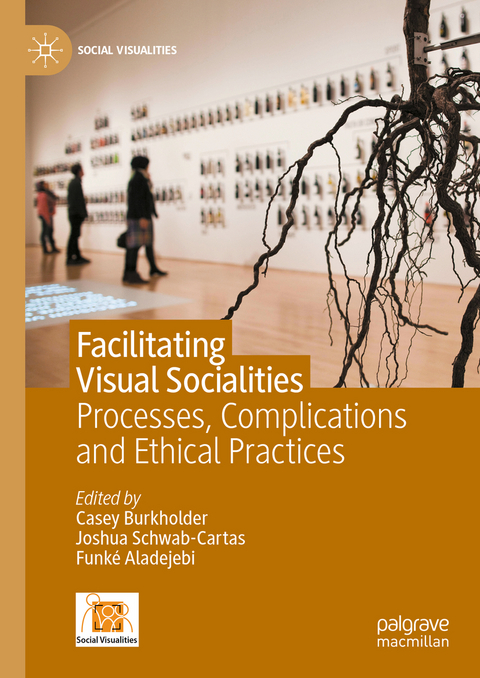
Facilitating Visual Socialities
Springer International Publishing (Verlag)
978-3-031-25258-7 (ISBN)
Casey Burkholder is an Associate Professor at the University of New Brunswick, Canada interested in critical teacher-education, and participatory visual research. Casey engages in research for social change through participatory visual approaches to local issues with youth and pre-service teachers. Joshua Schwab-Cartas is an Assistant Professor at NSCAD University, Canada. Dr. Schwab-Cartas uses cellphilms (or mobile technologies + film production) as an educational tool to explore Indigenous language revitalization strategies in the Isthmus Zapotec community of his maternal grandfather in Ranchu Gubiña, Oaxaca, Mexico. Funké Aladejebi is an Assistant Professor at the University of Toronto focusing on Black Canadian history. Her research and teaching interests focus on oral history, the history of education in Canada, Black Canadian women’s history, and transnationalism.
Chapter 1: Introduction: Facilitating Visualities-Enacting Ethical Practices in Visual Research.- Chapter 2: Facilitating Black Identity and Advocacy: Creating Cellphilms for Reflecting on Issues Affecting Black Students.- Chapter 3: The Fibres of Our Being: A Visual Artefact of Community-Engaged Visual Arts in St. James Town.- Chapter 4: An Afternoon Making Mole with My Jña Bida (Grandmother): A Zapotec Approach to Facilitation.- Chapter 5: Narrow AI-Powered Visualization Facilitation Tools in Foreign Language Learning: A Visual Approach Promoting Equal Opportunities in Foreign Language Grammar Teaching.- Chapter 6: (In)Visible Youth: Considerations for Visual Research in Rural New Brunswick's Queer Spaces.- Chapter 7: Pivoting Online in a Pandemic: Facilitating Object Elicitation Interviews with Canadian Craft Vendors.- Chapter 8: Facilitating Ethical Participatory Visual Research in Taboo Spaces.- Chapter 9: Facilitating a "Virtual Space" for Social Change During the COVID-19 Pandemic: Working with High-Risk Population Using an Arts-Informed Method.- Chapter 10: Facilitating Gender-Affirming Participatory Visual Research in Embodied and Online Spaces.- Chapter 11: Researcher Positionality: Reflexivity, Ethnic Identities, and Cultural Lines of Difference in Multicultural Research.- Chapter 12: When I Facilitate, What Do I Make? Revisiting Research Facilitation as Intervention, Opportunity, and Solidarity-Building.- Chapter 13: For Us, with Us: Creative Expressions as Means to Collectively Elevate Minoritized Experiences, Knowledge, and Wisdom.- Chapter 14: Engaging in Collaborative Visual Research Practice with Refugees to Promote Social Inclusion and Enhance Belonging in Non-metropolitan Australia.- Chapter 15: Ethical and Methodological Considerations for Facilitating Community-Based Participatory Visual Research with Queer and Disabled Elders.- Chapter 16: Experiential and Land-Based Learning of Wapana'ki Language, Culture and Art, and Worldviews: PiquingInterest and Accessibility Through Digital Archiving.- Chapter 17: Facilitating Art in Digital Classrooms During COVID-19: Engaging in Inquiry with Jamaican Visual Art Teachers.- Chapter 18: Facilitating Ethical Visual Sociological Research: What Difference Can We Make Together?.
| Erscheinungsdatum | 26.05.2023 |
|---|---|
| Reihe/Serie | Social Visualities |
| Zusatzinfo | XXI, 356 p. 33 illus. |
| Verlagsort | Cham |
| Sprache | englisch |
| Maße | 148 x 210 mm |
| Gewicht | 621 g |
| Themenwelt | Sozialwissenschaften ► Kommunikation / Medien ► Medienwissenschaft |
| Sozialwissenschaften ► Soziologie | |
| Schlagworte | Arts-based Research • Ethical Research • Participatory Visual Research • Qualitative research • research facilitation • Research methods • Visual Sociology |
| ISBN-10 | 3-031-25258-6 / 3031252586 |
| ISBN-13 | 978-3-031-25258-7 / 9783031252587 |
| Zustand | Neuware |
| Informationen gemäß Produktsicherheitsverordnung (GPSR) | |
| Haben Sie eine Frage zum Produkt? |
aus dem Bereich


